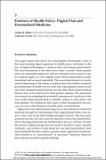Frontiers of Health Policy: Digital Data and Personalized Medicine
Author(s)
Miller, Amalia R.; Tucker, Catherine Elizabeth
Download688844.pdf (162.0Kb)
PUBLISHER_POLICY
Publisher Policy
Article is made available in accordance with the publisher's policy and may be subject to US copyright law. Please refer to the publisher's site for terms of use.
Terms of use
Metadata
Show full item recordAbstract
This paper argues that due to two unstoppable mechanisms, some of the most pressing future questions in health policy will relate to the use of digital technologies to analyze data concerning patient health. The first mechanism is the shift away from a system where patient data was essentially temporary and not intended to be reused or easily accessed again, to a new digital world where patient data is easily transferred and accessed repeatedly. The second mechanism is a fundamental deepening of the nature of patient data that enables increased personalization of health care for each individual patient, based on not only their detailed medical history, but also their likely future medical history that can be projected for their genetic makeup. We summarize our research investigating the potential consequences of policies in this new world where patient data is virtually costless to store, share, and individualize. We emphasize that issues of data management and privacy are now at the forefront of health policy considerations.
Digital data and digital technologies have the potential to transform medicine through two mechanisms. First, digital patient data is far easier to share and access than traditional paper records. This has many potential upsides, but also raises the question of how the potential benefits of sharing patient data are moderated by privacy concerns. Second, the advent of digital storage has now made it possible to store, virtually costlessly, vast swathes of data about any one individual patient. Such individualized data also enables a patient-centric approach to medicine, often referred to as “personalized” or “precision” medicine, based on that individual patient’s genetic makeup.
This article discusses the potential benefits and possible policy consequences of this digital shift. It emphasizes that the benefits of digital technologies are found when data is actually transferred and repeatedly accessed. This emphasizes that policies that wish to encourage the potential upside of digital technologies should emphasize easy data transfer. Empirical evidence suggests that health-care providers may not individually have the right incentives to share data, and therefore if a policy aims to encourage data transfer it needs to not only subsidize the adoption of digital technologies, but also make sure that there are the right incentives to use these technologies to share data. Often, well-meaning policies toward data security and data privacy can hamper this process. This article also suggests that there are distinct concerns related to the deepening and individualizing of data that is associated with personalized medicine, and that while there is potentially a large upside in terms of medical outcomes, the risks associated with this data are unusual. If policymakers seek to encourage personalized medicine, they might be especially successful to employ an approach to data management that gives control of the use of the data to the patient.
Date issued
2017-01Department
Sloan School of ManagementJournal
Innovation Policy and the Economy
Publisher
University of Chicago Press
Citation
Miller, Amalia R., and Catherine Tucker. “Frontiers of Health Policy: Digital Data and Personalized Medicine.” Innovation Policy and the Economy 17 (January 2017): 49–75.
Version: Final published version
ISSN
1531-3468
1537-2618